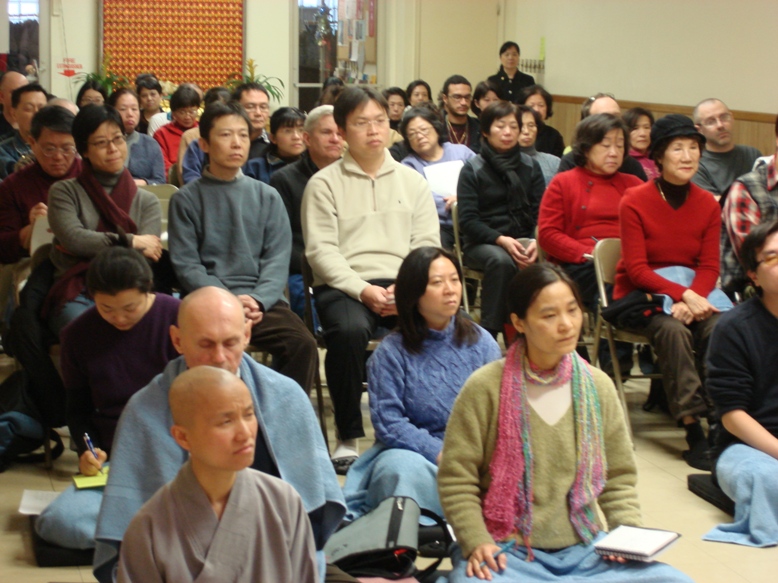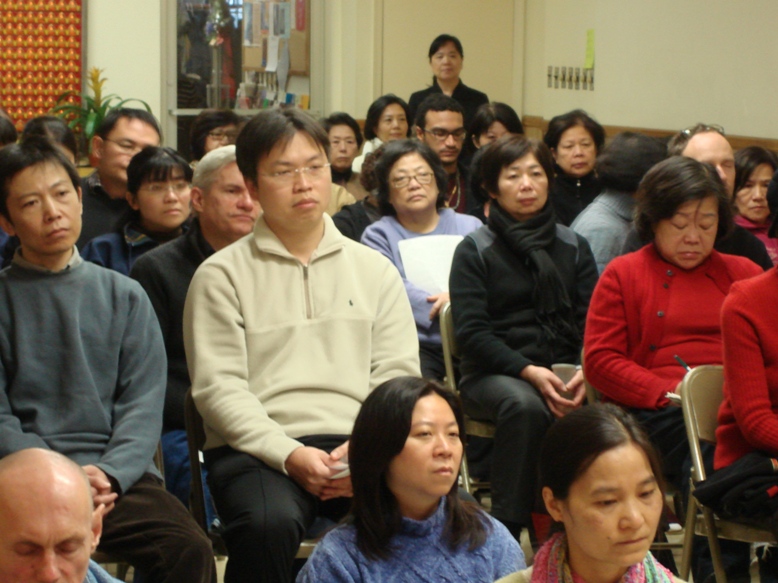
Chan Series - Part 1
To Perceive That All Five Skandhas Are Empty
By
Chang Jie
12/21/2008

Venerable Guo Xing, Abbot of Dharma Drum Retreat Center and Chan Meditation Center, gave a
talk entitled "To Perceive That All Five Skandhas Are Empty", the first of the dharma lecture
series on Chan at CMC on Sunday, December 21, 2008.
Venerable started by saying that we often mistake the five skandhas to be the self. The five
skandhas (also known as "aggregates") are form, sensation, perception, volition and consciousness.
These five skandhas make up the human experience of the phenomenal world (or external experience)
and our mental experiences (or internal experience).

Venerable used the example of anger. Form is the object of our senses (in this case, the person
with whom we are angry). Sensation is the feeling we experience (the feeling of anger).
Perception is the function of recognition of the outside world (an example would be distinguishing
the person you are angry at from others). Volition may be the decision we make at the moment of
anger (whether it is the intention to say an angry word in response or to be silent and just observe
the angry thought). Consciousness is the ability to be conscious of the differences and be aware
of the existence of mental and physical phenomena. (The memory of the person that you are angry at
or the event that evokes the emotion of anger is stored in the consciousness).
 Things become problematic when we equate the skandha(s) with the self. For example, we may think of
someone and have a feeling of anger towards this person. When we are angry at that person, are we
angry at the actual person or the image of the person in our minds? Are we angry at the person or
the memory? We can look at form and realize that it is merely an image in the mind; what we see as
an external form is really an image in our retina.
Things become problematic when we equate the skandha(s) with the self. For example, we may think of
someone and have a feeling of anger towards this person. When we are angry at that person, are we
angry at the actual person or the image of the person in our minds? Are we angry at the person or
the memory? We can look at form and realize that it is merely an image in the mind; what we see as
an external form is really an image in our retina.
Likewise, often times, we mistake the memory of the self to be the true self. Our memories arise in our
minds so quickly that it is hard to differentiate memories from reality. Although we have great mental
capacities like the Buddha, because of our mental and habitual patterns, our mind's effectiveness is reduced.
 The five skandhas are empty because their existence is impermanent and dependent on the rest of reality.
Things exist and cease to exist because of causes and conditions. With a clear understanding of the
concept of the emptiness of all five skandhas, we can be less fearful. If we are able to understand
this fully and use methods of meditation to penetrate the five skandhas, we can attain wisdom and cure
our illnesses and remove our vexations from the root and not merely treat the symptoms.
The five skandhas are empty because their existence is impermanent and dependent on the rest of reality.
Things exist and cease to exist because of causes and conditions. With a clear understanding of the
concept of the emptiness of all five skandhas, we can be less fearful. If we are able to understand
this fully and use methods of meditation to penetrate the five skandhas, we can attain wisdom and cure
our illnesses and remove our vexations from the root and not merely treat the symptoms.
The talk concluded with a question and answer session from the audience and encouragement from Venerable
to recognize that the images that we see in our minds are not reality but really empty.
References: "The Five Skandhas", There Is No Suffering by Chan Master Sheng-Yen
"Introduction to the Heart (of the Prajna-Paramita) Sutra",
http://www.dmcclanahan.com/heart_sutra.htm#skandha5
|